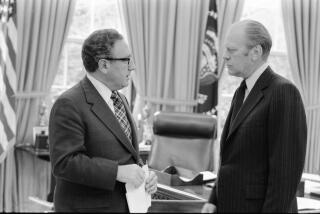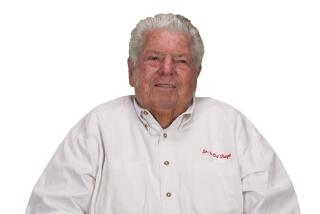Robert Ingersoll dies at 96; ambassador to Japan, industrialist
Robert S. Ingersoll, a Chicago industrialist who exchanged his business career for one as a diplomat, serving as U.S. ambassador to Japan and deputy secretary of State in the 1970s, has died. He was 96.
Ingersoll died Sunday at a retirement home in Evanston, Ill., of what his family said were natural causes.
As chairman and chief executive of Borg-Warner in the 1960s, Ingersoll oversaw phenomenal growth at one of the nation’s industrial giants producing automotive equipment, plastics and air conditioning and industrial equipment. In that decade he boosted his company’s international sales to more than $1 billion, traveled to 22 countries and visited Japan about 10 times.
That experience combined with his reputation in the Republican Party led to his 1972 appointment by President Nixon as U.S. ambassador to Japan.
After Ingersoll proved successful in strengthening economic relations with Japan, he was summoned to Washington, D.C., in 1974 to be assistant secretary of State for East Asian and Pacific affairs. Hebecame deputy secretary of State from 1974 to 1976.
George P. Shultz, Treasury secretary under Nixon, secretary of State under Ronald Reagan and now a fellow at Stanford University’s Hoover Institution, recalled Ingersoll’s evolution from businessman to diplomat to an official with the White House Cabinet.
“He was a great success in Japan, in part because he instinctively took the trouble to learn about Japan and its culture and its distinctiveness,” Shultz said in a phone interview. “So I think his main contribution was the almost astonishing development of our relations with the Asia-Pacific region in that period … given all the tensions in Vietnam.”
Robert Stephen Ingersoll was born Jan. 28, 1914, in Galesburg, Ill. After graduating from Yale University, Ingersoll landed his first job at Armco Steel Corp. In 1939, he joined Ingersoll Steel and Disc Co., which was owned by his father and would eventually merge with Borg-Warner.
In 1961, Ingersoll was selected to succeed his father as chairman and chief executive of Borg-Warner.
Ingersoll resigned from his State Department post in February 1976. Soon after, he retired and returned to northern Illinois.
In his memoirs, Ingersoll wrote that he once told his family that he would never work in Washington because he saw how officials attempted to further their positions “through backbiting or apple polishing.” But after serving during such a significant point in this nation’s history, Ingersoll later wrote: “I wouldn’t trade those years in the State Department for any other time in my life.”
Ingersoll is survived by three daughters and 11 grandchildren. His wife of 63 years, Coralyn, died in 2001.
maramirez@tribune.com
More to Read
Start your day right
Sign up for Essential California for the L.A. Times biggest news, features and recommendations in your inbox six days a week.
You may occasionally receive promotional content from the Los Angeles Times.






